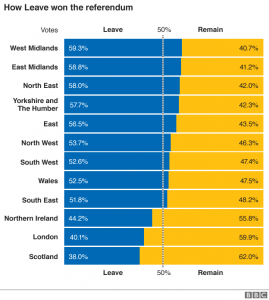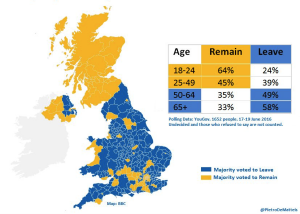As news networks have been reporting over the last few days, a referendum was held on Thursday June 23rd to decide whether or not the UK should remain in the European Union.
According to the BBC News, the vote for the UK to leave the EU won 52% to 48%.
The breakdown of the vote by region can be found in the chart below:
Based on media reports, the generation that will be the most affected by the decision to separate from the EU will be millennials, who overwhelmingly voted to remain in the EU. 75 percent of people aged between 18 and 24 voted Remain, compared to the 61 percent of people over the age of 65 who voted Leave.
With such a large millennial population voting Remain, the thing that an event like this sheds the most light on is the importance of millennial civic engagement and participation in the political process.
The map below shows how votes were cast amongst different demographics of the voting population:
So why were so many older voters so keen to sever ties with the European Union?
According to Joe Twyman, head of political and social research at YouGov, “In the past, middle-class baby boomers have been more likely to vote because of a sense of civic duty and that because voting is ‘the right thing to do,’” but this time, “It was about a feeling that they are disaffected about the way things are going in this country, whether that’s the EU, Westminster or just life in general,” Twyman said. “The world has moved on in a way they are not comfortable with and they did not consent to.”
With the separation of the UK from the EU, how will this affect the current millennial generation in the future?
Some of the immediate concerns of affected millennials are:
- Limits on social mobility: The younger generation has lost the right to live and work in the other member states of the EU
- The study abroad program Erasmus may now be compromised
- Brexit could cost the country up to 820,000 jobs, and some millennials are worried they’ll be the most impacted group
A serious point of contention in this vote is that the generation that will be most affected by the result (millennials) were seemingly outnumbered in the voting by older voters. The eruption of discontent on social media shows the frustration that this demographic has with the outcome of the vote.
One of the truly awful dynamics in all of this is that the young Remain crowd get stuck with awful decision by the old folks.
— Steve Saideman (@smsaideman) June 24, 2016
Not sure I understand why 80 plus year olds were allowed to vote for the future of the next generation while 16/17 year olds weren’t
— Sandra Laville (@sandralaville) June 24, 2016
The lack of representation that millennials feel they received has sparked a conversation on the importance of civic engagement amongst millennials.
According to the Pew Research Center, “While the growth in the number of millennials who are eligible to vote underscores the potential electoral clout of today’s young adults, millennials remain far from the largest generational bloc of actual voters.” It was added that “While it might be a ‘slam-dunk’ that millennials soon will be the largest generation in the electorate, it will likely be a much longer time before they are the largest bloc of voters.”
In order for millennials to have their opinions heard, there will need to be a greater voter turnout among this generation in future political processes. As a generation that is less engaged in the political process than previous generations, the political engagement of this generation is crucial in order to build their desired future.
As politically aware as millennials may be as the most connected and educated generation ever, the importance of millennial civic engagement cannot be understated and will only become more important in the coming years.
What are your thoughts on the Brexit vote? Do you think there was equal representation in the vote? Are millennials less engaged in the political process than earlier generations? How will this vote affect the future of Europe and European millennials? Let me know in the comment section below.
For more business tips, check our entrepreneurship section and subscribe to our weekly newsletters.







